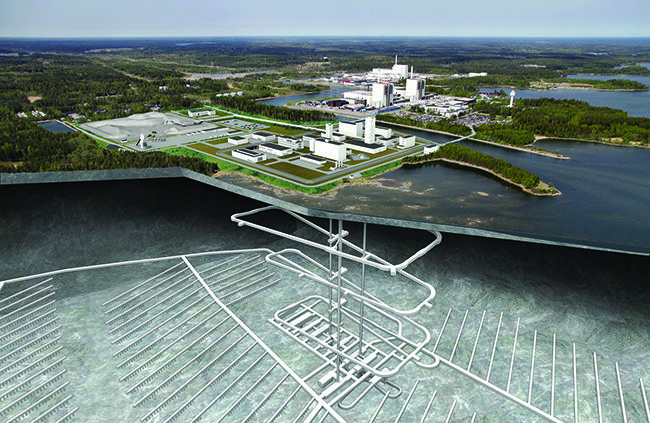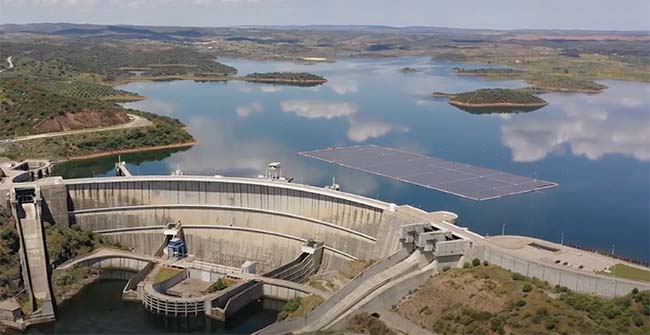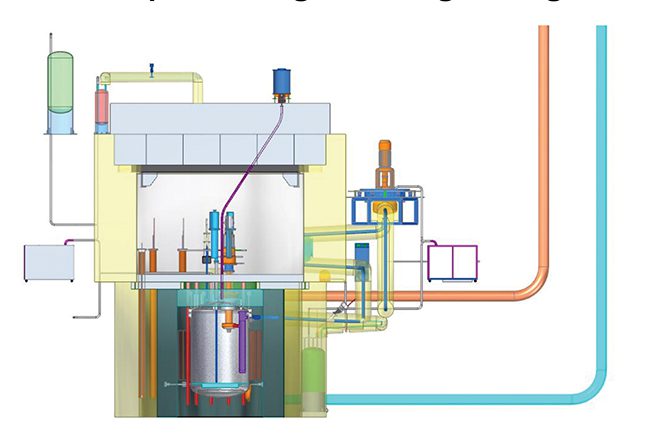The 12 Most-Read POWER Global Monitor Articles of 2022

Every month, POWER magazine publishes several articles in its Global Monitor section covering topics important to the electric power generation industry. The articles typically feature interesting updates on progress made at notable projects around the world, big policy changes, or promising research and development (R&D) news. Short notes about major contracts are also touched on in the POWER Digest area at the end of the section. Global Monitor articles are often among the most-read stories in POWER magazine, and the following were the most-read Global Monitor stories of 2022.
Disorderly Transitions: Eight Enduring Global Power Sector Trends (January 2022)This article took a deep dive into the International Energy Agency's (IEA's) World Energy Outlook. The report was issued near the end of 2021 ahead of the United Nations Climate Change Conference (COP26) meeting in Glasgow, Scotland. Eight overarching trends were identified from the Paris-based agency's annual outlook.
Among the notable findings was that despite massive additions of solar and wind energy capacity around the world, unabated coal-fired generation was still slated to be the largest source of electricity through 2030 under the Stated Policies Scenario" (STEPS). Read other insight from the report at: https://www.powermag.com/disorderly-transitions-eight-enduring-global-power-sector-trends/.
China Starts Up First Fourth-Generation Nuclear Reactor (February 2022)This article reported on China's much-watched high-temperature gas-cooled modular pebble bed (HTR-PM) demonstration project. The first of two units at the site was successfully connected to the grid on Dec. 20, 2021. The achievement marked a major milestone for fourth-generation advanced nuclear technology.
The HTR-PM demonstration comprises two pebble-bed reactor modules-each of which consists of a reactor pressure vessel, graphite, carbon, and metallic reactor internals-a steam generator, and a helium blower. Among the HTR-PM's distinctive differentiators, when compared to PWR technology, for example, is that it uses helium as a coolant. Learn more about the project at: https://www.powermag.com/china-starts-up-first-fourth-generation-nuclear-reactor/.
Sweden's Government Approves Construction of Spent Nuclear Fuel Repository (March 2022)Sweden's government in late January 2022 gave radioactive waste management company Svensk Karnbranslehantering AB (SKB) the green light to proceed with a deep geological repository (DGR) for spent nuclear fuel (SNF) at a site near Vattenfall's 3.2-GW Forsmark nuclear power plant (Figure 1). The milestone, which wrapped up a planning process that took more than 40 years, made Sweden only the second country, after Finland, to take active steps on building a permanent SNF repository.
 1. This photo montage shows the final deep geological repository for 12,000 tonnes of spent nuclear fuel in Forsmark, in Sweden. The total length of the tunnel system is more than 60 kilometers. Below ground, the repository covers three to four square kilometers at a depth of 500 meters. Courtesy: SKB
1. This photo montage shows the final deep geological repository for 12,000 tonnes of spent nuclear fuel in Forsmark, in Sweden. The total length of the tunnel system is more than 60 kilometers. Below ground, the repository covers three to four square kilometers at a depth of 500 meters. Courtesy: SKBSKB said when the DGR is fully developed sometime in the 2080s, it will include 60 kilometers of tunnels with room for 6,000 copper canisters holding up to 12,000 tonnes of SNF. The DGR's construction will consist of two parts: an operations area on the ground surface and a deposition area below ground. The underground facility will require boring several tunnels, 300 meters in length, to depths of up to 500 meters. Read about other features of the project at: https://www.powermag.com/swedens-government-approves-construction-of-spent-nuclear-fuel-repository/.
Australia's Coal Conundrum: Economy, Climate at Odds (April 2022)Coal has long been a lifeblood for Australia. The country is the world's largest exporter of metallurgical coal used to make steel, and it's the second-largest exporter of coal for use in power generation, supplying much of Asia. Government data shows the coal industry directly or indirectly supports more than 150,000 jobs, and in recent years has contributed more than $60 billion in economic impact annually. Furthermore, coal-fired generation accounts for as much as 60% of the country's electricity.
Yet, the coal industry faces headwinds in Australia, as the country joins much of the rest of the world in developing decarbonization strategies to hit climate targets-in Australia's case, a goal of net-zero emissions by 2050. This article looks at coal, renewable, and other power sector trends in Australia, and includes insight from leading experts on what to expect going forward. Find out more at: https://www.powermag.com/australias-coal-conundrum-economy-climate-at-odds/.
Dramatic Innovation-Driven Ramp Up of Floating Offshore Wind Anticipated by 2030 (May 2022)A drumbeat of floating offshore wind-related developments this year suggests the pipeline for the long-nascent wind technology sub-sector may be finally beginning to grow. While floating wind's current contribution of total wind installations is only 0.1%, recent developments suggest floating offshore wind is slated to expand to 16.5 GW by 2030, accounting for 6.1% of global wind installations, according to the Global Wind Energy Council (GWEC).
In a March report, GWEC said that floating offshore wind has officially cleared the demonstration and trial phase in its roadmap to commercialization and is now definitively in its pre-commercial" phase. Learn more about recent industry firsts that could help propel offshore wind installations forward at: https://www.powermag.com/dramatic-innovation-driven-ramp-up-of-floating-offshore-wind-anticipated-by-2030/.
Morocco Project Could Support UK's Renewable Goals, Hydrogen Economy (June 2022)A project to bring solar and wind energy from a 10.5-GW project in Morocco to the UK will feature what is likely the world's longest subsea, high-voltage direct current (HVDC) cables. The importation of renewable energy also could provide the UK with another avenue for production of alternative fuels, such as hydrogen, to help decarbonize industry, a major focus of the country's climate strategy announced last year that looked at offshore wind as a driver of a hydrogen energy economy.
The Morocco project has piqued the interest of renewable energy advocates and those who envision it as a model for intercontinental clean energy projects that could serve multiple purposes. In the case of the UK, it also could be part of the country's recent push to reduce reliance on energy imports from Russia, after that country's invasion of Ukraine moved many nations to reduce or eliminate their use of Russian-produced energy. Find out what exactly is being done in Morocco at: https://www.powermag.com/morocco-project-could-support-uks-renewable-goals-hydrogen-economy/.
Floating Solar Project Supports Portugal's Decarbonization Strategy (July 2022)The largest floating solar farm in Europe, located on the reservoir for a hydroelectric dam in Portugal, began commercial operation this summer. The startup of the Alqueva installation (Figure 2), on Western Europe's largest artificial lake, is part of EDP's plan to make its power generation net zero by 2030.
 2. The Alqueva Dam in Portugal is on the Guadiana River, one of the longest rivers in the Iberian Peninsula. The dam was completed in 2002. The 518-MW power station at the site was commissioned in two phases, in 2004 and 2013, respectively. Alqueva is the largest dam and artificial lake in Western Europe. The solar array is expected to enter commercial operation July 15. Courtesy: EDP
2. The Alqueva Dam in Portugal is on the Guadiana River, one of the longest rivers in the Iberian Peninsula. The dam was completed in 2002. The 518-MW power station at the site was commissioned in two phases, in 2004 and 2013, respectively. Alqueva is the largest dam and artificial lake in Western Europe. The solar array is expected to enter commercial operation July 15. Courtesy: EDPThe Alqueva project is part of Portugal's effort to decarbonize its power generation sector. The country shut down its last coal-fired power plant in November, closing the 628-MW Pego station located northeast of Lisbon. Much of the country's power comes from more than a dozen hydroelectric installations, including the Alto Rabagao Dam, where in 2017 EDP installed an 840-panel pilot floating solar farm. That was the first project in Europe that tested the pairing of hydro and solar power. Learn more about Portugal's renewable energy strategy at: https://www.powermag.com/floating-solar-project-supports-portugals-decarbonization-strategy/.
Holtec Unveils Green Boiler Designed to Repurpose Coal Plants (August 2022)Holtec International, an equipment provider that specializes in the design and manufacture of parts for nuclear reactors, in May unveiled a green boiler" technology that is designed to repurpose existing coal-fired power plants. It was reportedly in discussions with prospective coal-fired power plant owners to build its first Green Boiler facility.
The Green Boiler, is essentially a large capacity modular energy storage system that comprises a large thermal reservoir filled with engineered salts spiked with infrared emitter particles," Joe Delmar, Holtec's senior director of Government Affairs and Communications, told POWER in May. Each module can store about 60 MWh of thermal energy with a standard design target of 12 hours. Read more about the technology at: https://www.powermag.com/holtec-unveils-green-boiler-designed-to-repurpose-coal-plants/.
Rapid Progress for Japan's Offshore Wind Ambitions (September 2022)Japan's ambitions to install up to 10 GW of offshore wind power by 2030 made rapid progress this summer, driven partly by accelerated action to address a supply and demand mismatch. Weeks after construction kicked off at the 140-MW Akita Noshiro offshore wind farm-Japan's first commercial offshore wind farm-Siemens Gamesa Renewable Energy (SGRE) on July 29 reported it received a firm order for the 112-MW Ishikari offshore wind power project.
According to the GWEC, Japan has approximately 128 GW of fixed-bottom offshore wind potential and 424 GW of floating offshore wind potential. Considering Japan as an archipelago with strong wind speeds-even stronger and steadier offshore-the development of offshore wind is indispensable to increasing renewable energy supplies," the organization said in its latest global offshore wind outlook. Learn about some of the projects currently underway and how the government plans to expand wind energy even more at: https://www.powermag.com/rapid-progress-for-japans-offshore-wind-ambitions/.
Can Power Plant Wastewater Be Valuable? (October 2022)The rise and rapid adoption of the circular economy-a systems solution framework that seeks to keep materials, products, and services in circulation for as long as possible-is triggering an interesting shift in how wastewater is being viewed. One view posits that wastewater should no longer be seen as waste, owing to the possibility that industry may recover several valuable resources from it. These include water, energy, fertilizers, biofuels, biopolymers, and critical minerals.
This type of resource recovery has thrived, primarily in higher-income countries, as part of established efforts relating to general wastewater treatment. However, their uptake in the power industry has suffered setbacks, given complex water quality. Still, several R&D efforts in recent years suggest promise. Learn where and how new technology is being utilized at: https://www.powermag.com/can-power-plant-wastewater-be-valuable/.
China Approves Commissioning of Thorium-Powered Reactor (November 2022)China's Ministry of Ecology and Environment on Aug. 2 gave Shanghai Institute of Applied Physics (SINAP) the green light to commission the experimental 2-MWth thorium-based molten salt reactor (TMSR-LF1, Figure 3) at the Hongshagang Industrial Cluster, Wuwei City, Gansu Province.
 3. This graphic visualizes the thorium-based molten salt reactor (TMSR-LF1) engineering design. A 2-MWth version of the TMSR is under commissioning in China. Courtesy: SINAP
3. This graphic visualizes the thorium-based molten salt reactor (TMSR-LF1) engineering design. A 2-MWth version of the TMSR is under commissioning in China. Courtesy: SINAPIf successful, the TMSR-LF1 could pave the way for development and construction of a larger demonstration facility by 2030, as well as construction of a TMSR fuel salt batch pyroprocess demonstration facility to realize thorium-uranium cycle usage by the early 2040s. Find out how the reactor works and why it's important at: https://www.powermag.com/china-approves-commissioning-of-thorium-powered-reactor/.
Major Energy Players Seal Big Deals for Renewables (December 2022)The world's oil and gas (O&G) majors, along with some of the largest utility companies, continue to invest in renewable energy as they develop diversified power generation project portfolios. Among the latest is France's TotalEnergies, which in late October announced an investment of about $580 million into a joint venture with Casa dos Ventos, a major wind and solar player in Brazil.
A report from Rystad Energy, published in October, found that capital investments in renewable energy had reached $494 billion this year, compared to $446 billion for oil and gas during the same period. Rystad, a Norway-based research firm, said it was the first time that investment in renewables topped funding for oil and gas projects. Find out what other O&G companies are getting entrenched in the renewables sector at: https://www.powermag.com/major-energy-players-seal-big-deals-for-renewables/.
-POWER staff.
The post The 12 Most-Read POWER Global Monitor Articles of 2022 appeared first on POWER Magazine.